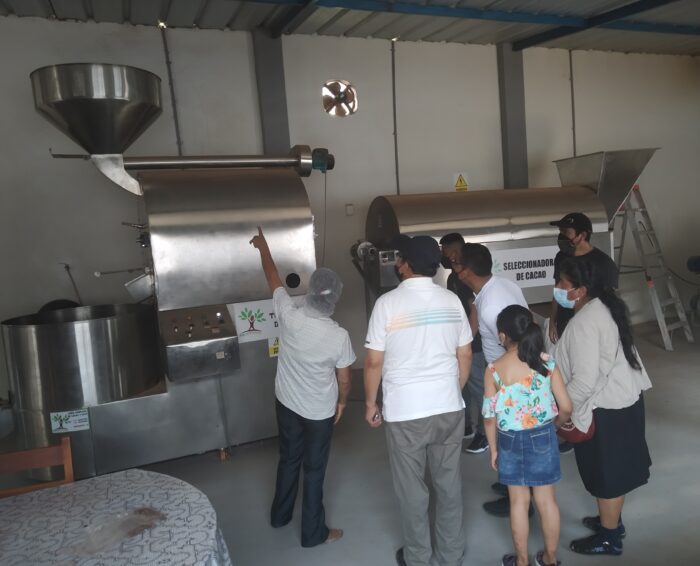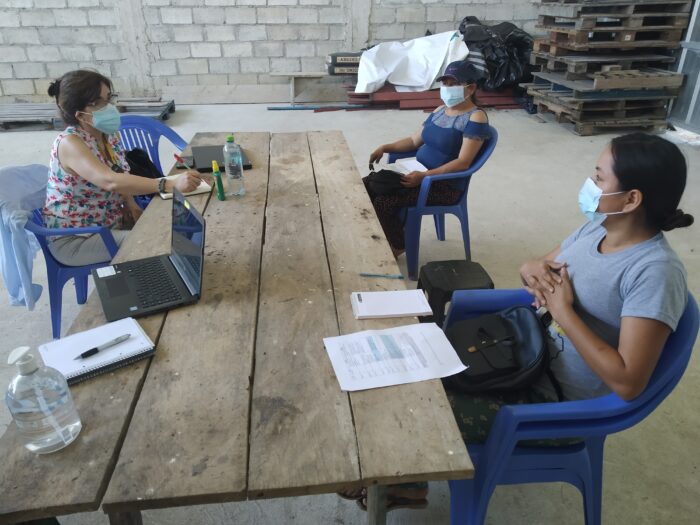
Historically, agriculture has been a male-dominated industry, where trade, agricultural education and policies have favored male farming and leadership over women. What often is forgotten is that women have been farming since the beginning of time, balancing physically demanding labor with household responsibilities. To say agriculture is male dominated would be ignoring the reality of women’s involvement in the food industry and according to the UN, 60-80% of food consumed in developing countries are produced by women.
Although education and social pressures in some societies do not favor women in leadership in the agricultural industry, the following women interviewed by Farmer-to-Farmer Peru Country Director Cynthia Mendoza and Senior Field Coordinator Ines Deustua share their experiences thriving and being challenged to become successful leaders in the industry. NCBA CLUSA’s USAID-funded Farmer-to-Farmer program has had the pleasure of collaborating with Elena Castro, Maricely Guevara, and Flor Mira Herrera for several years. Learn more about their challenges, successes, and leadership in cooperative development in Peru:
Maricely Guevara, APROSELVANOR General Manager, San Martin, Peru – Maricely assumed her role as the manager of Asociación de Productores Selva Nor Oriental (APROSELVANOR) in 2015. She came from a family of coffee growers and from a very young age has been passionate about coffee production. Her dedication to this industry stemmed from the desire to help producers develop their capacities and improve both the quality of product and quality of life of other associates. As the mother of 2 young children, Maricely works hard to strike a balance between being present in their lives and growing an organization of 50 producers. Her leadership skills and passion to develop the capabilities of the association members has allowed her to focus on gender inclusion. Since the start of APROSELVANOR in 2015, they have been able to ensure that women can find their place in the organization, receive qualifications, and hold positions both as partners and directors. These women are dedicated to continuing the growth of the organization through exporting, making special coffees, and working with collaborators, such as the Farmer-to-Farmer Program, to continue to develop their capabilities.
Elena Castro, CAI BELLA President of supervisory committee, San Martin, Peru – Elena entered into leadership of Cooperativa Agroindustrial y de Servicios del Centro Poblado de Bella (CAI BELLA) as a founding member in 2015, as a joint effort of the cooperative and DEVIDA (National Governmental Institution responsible to design and manage Peru’s National Policy to Fight Drugs) to further develop alternative businesses to illicit coca plantations. Before assuming her position, female cooperative members referred leadership within the cooperative as “a waste of time” or “it’s not worth it” because men and women had different opinions about the route the cooperative should take. Elena, motivated to represent her capabilities as a woman in leadership and with her extensive knowledge of farming, decided to assume the responsibility of leading CAI BELLA away from production of coca and into the production of chocolate. The transition from coca to cacao came from the desire to provide for their children through a less harmful industry and less lucrative industry knowing that, although it would be more taxing, producing cacao would ensure their children would remain in school. Elena and other women understood that this transition would be better for their families in the long run and in 2020 had grown to be 75 members, 33 of which were female. Women in CAI BELLA are responsible for manufacturing chocolate and have now successfully been able to produce an assortment of chocolates with 60%, 75% and 80% cacao.
Flormira Herrerra Jaramillo, General Manager of COCAU, San Martin, Peru – Flormira Herrera is a founding member, General Manager of Cooperativa Cacaotera Agroindustrial Uchiza (COCAU), and Agroindustrial graduate who returned to her hometown to embark on an adventure as a cooperative leader. Flormira is proud of the work she and the other coop members have accomplished. They have managed to survive the financial challenges imposed by the COVID-19 pandemic despite being a young and small co-op. They have successfully managed to not incur any debt in order to grow as a cooperative and in 2021, went from 53 active members to 73. As the mother of a young 4 year old boy, Flormira remains living with her father and mother to help balancing raising a young child and leading a new and emerging cooperative. Her role as a mother and leader includes raising a child while cutting costs, traveling to obtain financing, training members, and creating market opportunities for COCAU.
“I have a 4-year-old son. I am a single mother,” said Flormira Herrera. “There are days I must take my son to meetings and the field. My mother helps me with my son when I must go to work at the farm. I have had to distribute my obligations at home and at work. There are days that they (my family) cannot help me, so I must take my son to my work in the cooperative. It is a challenge because there are days that I must go out on a motorcycle to rural areas; trips of an hour and a half with him on my back and the motorcycle skids I am afraid to go through such lonely areas because I am a woman, they can do something to me or my son.”
Elena, Maricely, and Flor have all experienced reluctancy inside and outside their cooperative organizations because of their positions in leadership as women. Flor expressed the following when asked about challenges in her role, “Culturally, a man is more entrusted with financial and leadership issues. To issue and control documentation was the role of man. Some people still think that. When there is a loan request or processing there is a different treatment because I am a woman”. Despite these challenges, Flor, Maricely, and Elena have led their cooperatives towards successes as they have increased member involvement, created market opportunities, and been an example to other women in the agriculture industry.
“Don’t get discouraged, always try to fight for your goals” and “Like men, women can also do a lot at work, let’s break those stereotypes that women can’t do much, it’s a lie. We can achieve it,” said Mariely Guevara.

NCBA CLUSA’s Farmer-to-Farmer Program has had the pleasure of sending volunteers to CAI BELLA, APROSELVANOR, and COCAU in 2019. During these assignments the program has collaborated with leaders Maricely, Elena and Flor to complete assignments related to export strategy, marketing and branding, organizational development, financial education, sales diversification, chocolate making and honey water treatment. The Farmer-to-Farmer Program continues to work with women in leadership as part of one of its major goals to increase gender inclusion. Tune into Part 2 of this gender inclusion series by reading the upcoming article being published mid-June.


